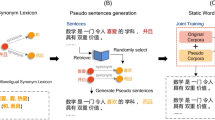Abstract
Most recent state-of-the-art approaches are proposed to utilize the pre-trained word embeddings for bilingual lexicon induction. However, the word embeddings introduce noises for both frequent and rare words. Especially in the case of rare words, embeddings of which are always not well learned due to their low occurrence in the training data. In order to alleviate the above problem, we propose BLIMO, a simple yet effective approach for automatic lexicon induction. It does not introduce word embeddings but converts the lexicon induction problem into a maximum weighted matching problem, which could be efficiently solved by the matching optimization with greedy search. Empirical experiments further demonstrate that our proposed method outperforms state-of-the-arts baselines greatly on two standard benchmarks.
Access this chapter
Tax calculation will be finalised at checkout
Purchases are for personal use only
Similar content being viewed by others
References
AP, S.C., et al.: An autoencoder approach to learning bilingual word representations. In: Advances in Neural Information Processing Systems, pp. 1853–1861 (2014)
Artetxe, M., Labaka, G., Agirre, E.: Learning principled bilingual mappings of word embeddings while preserving monolingual invariance. In: Proceedings of the 2016 Conference on Empirical Methods in Natural Language Processing, pp. 2289–2294 (2016)
Artetxe, M., Labaka, G., Agirre, E.: Learning bilingual word embeddings with (almost) no bilingual data. In: Proceedings of the 55th Annual Meeting of the Association for Computational Linguistics (Volume 1: Long Papers), vol. 1, pp. 451–462 (2017)
Artetxe, M., Labaka, G., Agirre, E.: A robust self-learning method for fully unsupervised cross-lingual mappings of word embeddings. ACL (2018)
Brown, P.F., Pietra, V.J.D., Pietra, S.A.D., Mercer, R.L.: The mathematics of statistical machine translation: parameter estimation. Comput. Linguist. 19(2), 263–311 (1993)
Burkard, R.E., Cela, E.: Linear assignment problems and extensions. In: Du, D.Z., Pardalos, P.M. (eds.) Handbook of Combinatorial Optimization, pp. 75–149. Springer, Boston (1999). https://doi.org/10.1007/978-1-4757-3023-4_2
Conneau, A., Lample, G., Ranzato, M., Denoyer, L., Jégou, H.: Word translation without parallel data. arXiv preprint arXiv:1710.04087 (2017)
Dinu, G., Lazaridou, A., Baroni, M.: Improving zero-shot learning by mitigating the hubness problem. Comput. Sci. 9284, 135–151 (2014)
Faruqui, M., Dyer, C.: Improving vector space word representations using multilingual correlation. In: Proceedings of the 14th Conference of the European Chapter of the Association for Computational Linguistics, pp. 462–471 (2014)
Gliozzo, A., Strapparava, C.: Exploiting comparable corpora and bilingual dictionaries for cross-language text categorization. In: Proceedings of the 21st International Conference on Computational Linguistics and the 44th annual meeting of the Association for Computational Linguistics, pp. 553–560. Association for Computational Linguistics (2006)
Ker, S.J., Chang, J.S.: A class-based approach to word alignment. Comput. Linguist. 23(2), 313–343 (1997)
Koehn, P.: Europarl: A parallel corpus for statistical machine translation. In: MT Summit, vol. 5, pp. 79–86 (2005)
Lu, A., Wang, W., Bansal, M., Gimpel, K., Livescu, K.: Deep multilingual correlation for improved word embeddings. In: Proceedings of the 2015 Conference of the North American Chapter of the Association for Computational Linguistics: Human Language Technologies, pp. 250–256 (2015)
Melamed, I.D.: Models of translational equivalence among words. Comput. Linguist. 26(2), 221–249 (2000)
Mikolov, T., Le, Q.V., Sutskever, I.: Exploiting similarities among languages for machine translation. arXiv preprint arXiv:1309.4168 (2013)
Nakazawa, T., et al.: ASPEC: Asian scientific paper excerpt corpus. In: LREC (2016)
Och, F.J., Ney, H.: A Systematic Comparison of Various Statistical Alignment Models. MIT Press, Cambridge (2003)
Riley, P., Gildea, D.: Orthographic features for bilingual lexicon induction. In: Proceedings of the 56th Annual Meeting of the Association for Computational Linguistics (Volume 2: Short Papers), vol. 2, pp. 390–394 (2018)
Sennrich, R., Haddow, B., Birch, A.: Neural machine translation of rare words with subword units. arXiv preprint arXiv:1508.07909 (2015)
Smadja, F., McKeown, K.R., Hatzivassiloglou, V.: Translating collocations for bilingual lexicons: a statistical approach. Computat. Linguist. 22(1), 1–38 (1996)
Smith, S.L., Turban, D.H., Hamblin, S., Hammerla, N.Y.: Offline bilingual word vectors, orthogonal transformations and the inverted softmax. In: ICLR (2017)
Vaswani, A., et al.: Attention is all you need. In: Advances in Neural Information Processing Systems. pp. 5998–6008 (2017)
Xing, C., Wang, D., Liu, C., Lin, Y.: Normalized word embedding and orthogonal transform for bilingual word translation. In: Proceedings of the 2015 Conference of the North American Chapter of the Association for Computational Linguistics: Human Language Technologies, pp. 1006–1011 (2015)
Zhang, M., Liu, Y., Luan, H.B., Sun, M., Izuha, T., Hao, J.: Building earth mover’s distance on bilingual word embeddings for machine translation. In: AAAI, pp. 2870–2876 (2016)
Zhang, M., Liu, Y., Luan, H., Sun, M.: Adversarial training for unsupervised bilingual lexicon induction. In: Proceedings of the 55th Annual Meeting of the Association for Computational Linguistics (Volume 1: Long Papers), vol. 1, pp. 1959–1970 (2017)
Acknowledgement
The work is supported by SFSMBRP (2018YFB1005100), BIGKE (No. 20160754021), NSFC (No. 61772076 and 61751201), NSFB (No. Z181100008918002), Major Project of Zhijiang Lab (No. 2019DH0ZX01), and CETC (No. w-2018018).
Author information
Authors and Affiliations
Corresponding author
Editor information
Editors and Affiliations
Rights and permissions
Copyright information
© 2019 Springer Nature Switzerland AG
About this paper
Cite this paper
Chi, Z., Huang, H., Zhao, S., Xu, HD., Mao, XL. (2019). Fast and Accurate Bilingual Lexicon Induction via Matching Optimization. In: Tang, J., Kan, MY., Zhao, D., Li, S., Zan, H. (eds) Natural Language Processing and Chinese Computing. NLPCC 2019. Lecture Notes in Computer Science(), vol 11838. Springer, Cham. https://doi.org/10.1007/978-3-030-32233-5_57
Download citation
DOI: https://doi.org/10.1007/978-3-030-32233-5_57
Published:
Publisher Name: Springer, Cham
Print ISBN: 978-3-030-32232-8
Online ISBN: 978-3-030-32233-5
eBook Packages: Computer ScienceComputer Science (R0)





